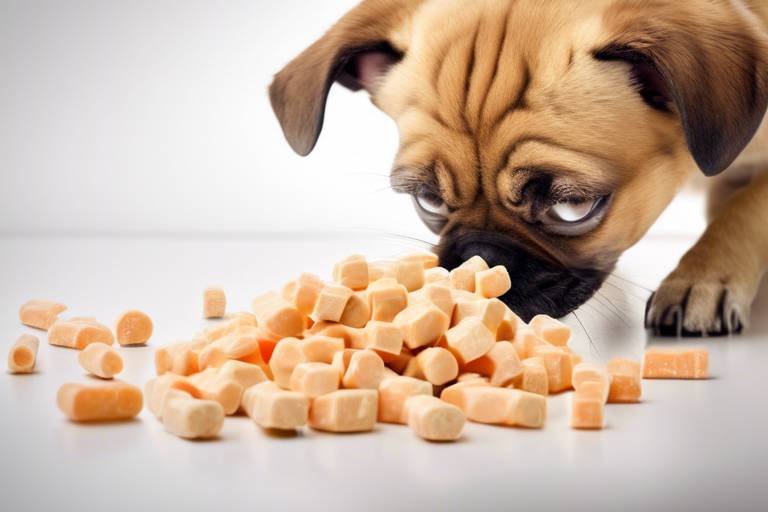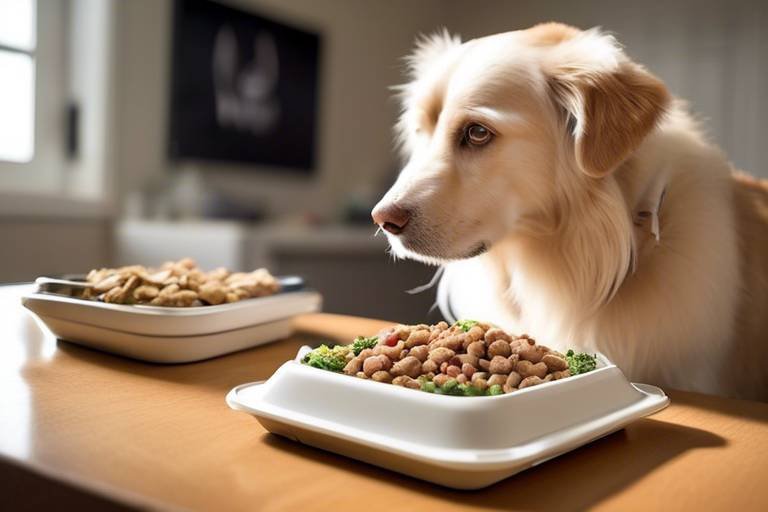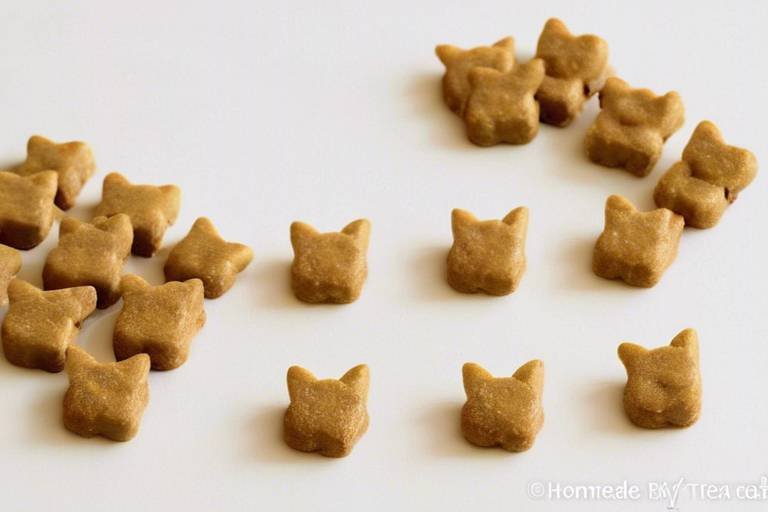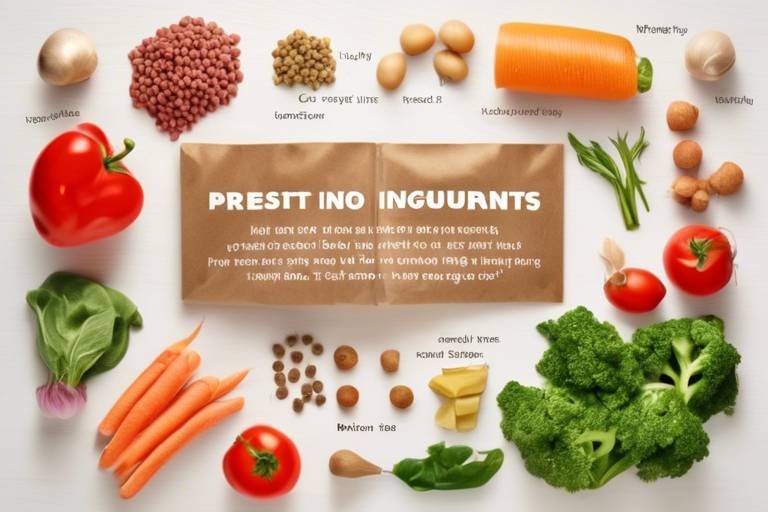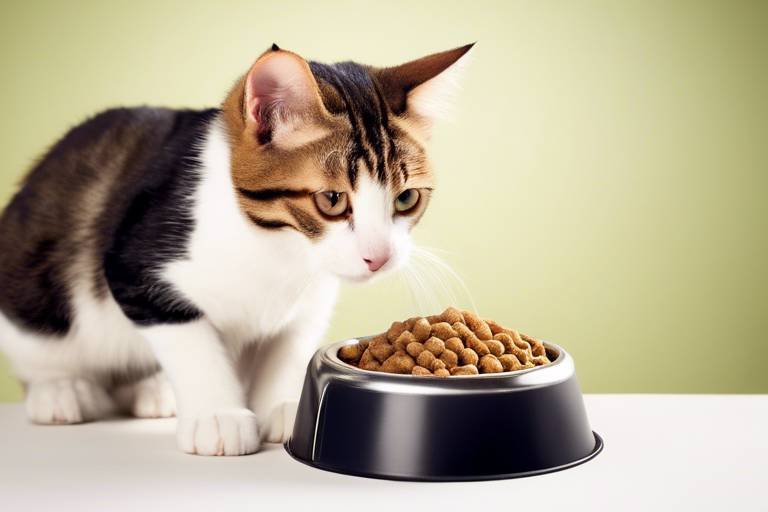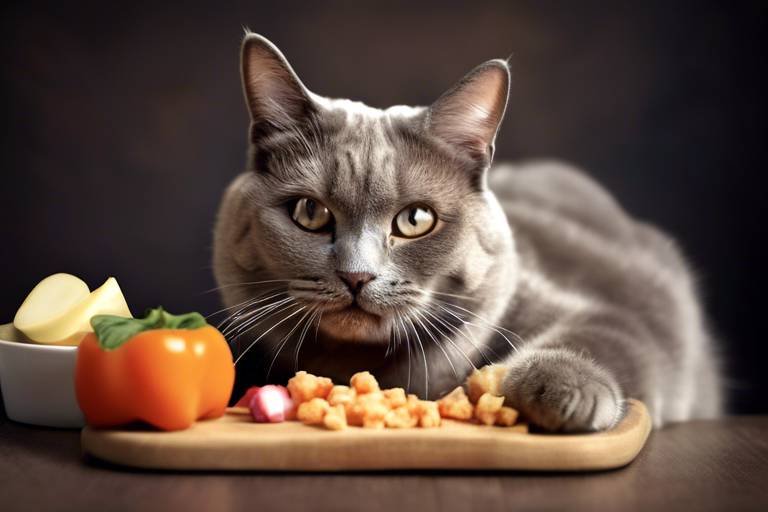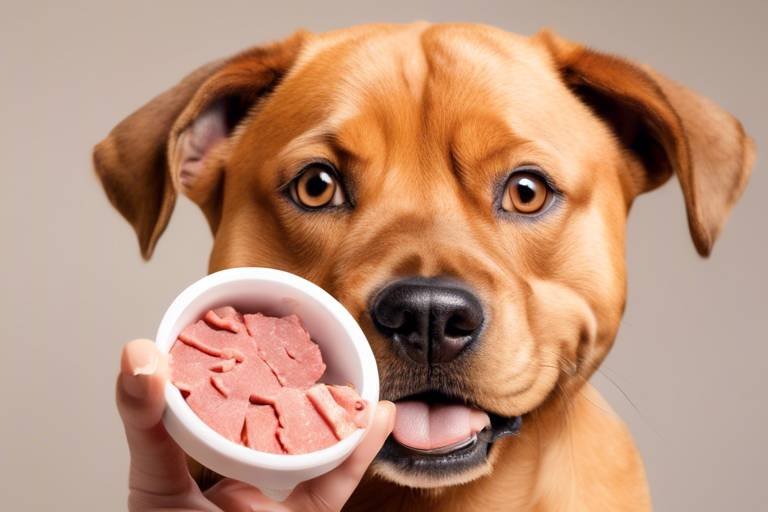The Importance of Calcium in Your Pet's Diet
Calcium plays a crucial role in maintaining your pet's overall health. This essential mineral is not just a building block for strong bones; it’s a key player in various bodily functions that keep your furry friends feeling their best. Imagine calcium as the unsung hero in your pet's diet, quietly working behind the scenes to support everything from muscle contractions to nerve signaling. Without adequate calcium, your pet could face serious health issues that could impact their quality of life.
So, why is calcium such a big deal for our pets? Well, think of calcium as the foundation of a house. Just as a house needs a solid foundation to stand tall, your pet needs calcium to maintain strong bones and teeth. Calcium is vital for:
- Bone Health: Calcium helps in the development and maintenance of strong bones, preventing conditions like osteoporosis.
- Muscle Function: It plays a crucial role in muscle contractions, allowing your pet to move freely and energetically.
- Nerve Signaling: Calcium is essential for transmitting signals between nerves, which is critical for overall body function.
Without enough calcium, pets can experience a range of health issues, making it essential for pet owners to understand how to incorporate this mineral into their diets effectively.
When it comes to ensuring your pet gets enough calcium, there are several dietary sources to consider. From natural foods to commercial supplements, you have options to meet your pet's calcium needs. Here’s a closer look:
Many natural foods are rich in calcium, making them excellent choices for your pet's meals. Some of the best options include:
- Dairy Products: Yogurt and cheese can be great sources of calcium, but be cautious with lactose-intolerant pets.
- Leafy Greens: Vegetables like kale, broccoli, and spinach are packed with calcium and other nutrients.
- Certain Fish: Sardines and salmon, especially with bones, are excellent calcium sources.
Incorporating these foods into your pet's diet can help ensure they receive the calcium they need for optimal health.
For pets with specific dietary needs or those who may not get enough calcium from their food, calcium supplements can be a beneficial addition. These come in various forms, including:
- Chewable Tablets: Easy to administer and often flavored to appeal to pets.
- Powdered Supplements: Can be mixed into food for easy consumption.
- Liquid Formulas: Ideal for pets who may refuse solid supplements.
When choosing a supplement, it’s important to consult with your veterinarian to find the right one for your pet’s unique needs.
If you're preparing homemade meals for your pet, ensuring adequate calcium intake is crucial. Balancing homemade diets can be tricky, but here are some tips:
- Include calcium-rich foods like crushed eggshells or ground bone meal.
- Consult a veterinary nutritionist to ensure your homemade diet meets all nutritional requirements.
- Regularly monitor your pet's health to adjust their diet as needed.
By taking these steps, you can create a well-rounded diet that supports your pet's calcium needs.
Recognizing the signs of calcium deficiency in pets is essential for preventing serious health issues. Symptoms may include:
- Weakness or lethargy
- Muscle twitching
- Dental problems, such as loose teeth
- Bone deformities or fractures
If you notice any of these symptoms, it’s crucial to seek veterinary advice promptly. Early intervention can make a significant difference in your pet's health.
The consequences of calcium deficiency can be severe, leading to a host of health problems. Insufficient calcium can cause:
- Brittle Bones: Pets may develop osteoporosis, making them more susceptible to fractures.
- Dental Issues: Calcium is vital for strong teeth, and a deficiency can lead to dental decay.
Calcium is vital for strong bones. A deficiency can lead to conditions like osteoporosis, where bones become weak and fragile. This not only affects your pet's mobility but can also result in painful fractures with minimal impact. Imagine your pet trying to jump or play, only to suffer a serious injury due to weak bones. This is why ensuring adequate calcium intake is non-negotiable.
For young pets, adequate calcium is crucial for proper growth. Without it, they might experience stunted growth or developmental issues. Think of calcium as the scaffolding that supports a growing structure; without it, the entire framework can become unstable. Ensuring your growing pet receives enough calcium sets them up for a healthy, active life.
Q: How much calcium does my pet need?
A: The amount varies by species, age, and health status. Consult your vet for specific recommendations.
Q: Can I give my pet too much calcium?
A: Yes, excessive calcium can lead to health issues. Always follow veterinary guidance.
Q: Are there vegetarian sources of calcium for pets?
A: Absolutely! Leafy greens, tofu, and fortified plant-based foods are excellent options.

Understanding Calcium's Role
Calcium is not just a mineral; it's a powerhouse nutrient that plays a crucial role in your pet's overall health. Think of calcium as the foundation of a house. Without a solid foundation, everything else can come crashing down. This essential mineral is vital for several bodily functions, including bone health, muscle function, and nerve signaling. Just like how we need calcium to keep our bones strong and our muscles moving, pets require it for the same reasons.
To understand the significance of calcium, let's break it down into a few key areas:
- Bone Health: Calcium is a major component of bones. It helps maintain their strength and density, ensuring that your furry friend can jump, run, and play without the risk of fractures.
- Muscle Function: Calcium plays a pivotal role in muscle contractions. When your pet's brain sends a signal to move, calcium helps the muscles respond. Without enough calcium, those signals can get muddled, leading to weakness or spasms.
- Nerve Signaling: Calcium is essential for transmitting signals between nerve cells. This means that everything from your pet's reflexes to their ability to feel and respond to their environment relies on adequate calcium levels.
Moreover, calcium interacts with other nutrients, such as phosphorus and vitamin D, to ensure optimal absorption and utilization. It's like a team working together to keep your pet healthy. A deficiency in calcium can disrupt this balance, leading to serious health issues. For instance, without enough calcium, your pet might experience muscle tremors or even seizures, as the nervous system struggles to function properly.
In summary, calcium is a vital nutrient that supports your pet's health in numerous ways. It’s not just about strong bones; it’s about ensuring that every system in your pet’s body operates smoothly. By understanding the importance of calcium, you can take proactive steps to ensure your pet receives adequate amounts through their diet, leading to a longer, healthier life.

Sources of Calcium for Pets
When it comes to ensuring your furry friends get enough calcium in their diets, understanding the sources available is key. Calcium is not just a single ingredient; it's a vital component that needs to be incorporated from various sources to keep your pets healthy and happy. Whether you have a playful puppy or a wise old cat, knowing where to find calcium can make all the difference in their overall health.
There are numerous dietary sources of calcium for pets, both natural and commercial. Natural sources are often the best way to provide this essential mineral, as they come packed with other nutrients that can enhance your pet's diet. For instance, dairy products like yogurt and cheese are not only rich in calcium but also provide probiotics that can aid digestion. However, it’s important to note that not all pets can tolerate dairy, especially those with lactose intolerance. So, always observe how your pet reacts to these foods.
Another fantastic natural source of calcium comes from leafy greens. Vegetables such as kale, spinach, and broccoli can be great additions to your pet's meals. They not only supply calcium but also offer a wealth of vitamins and minerals that contribute to overall health. If you're looking for something a bit different, certain fish, especially those with bones like sardines and salmon, are also excellent sources. These fish can be a tasty treat and a nutritious option for your pet.
But what if your pet has specific dietary needs or restrictions? This is where commercial supplements come into play. There are various types of calcium supplements available on the market, including chewable tablets, powders, and even liquid forms. When selecting a supplement, it's crucial to choose one that is specifically designed for pets, as human supplements may not be safe for them. Always consult with your veterinarian to determine the appropriate dosage and type of supplement that suits your pet's individual needs.
If you're a fan of preparing homemade meals for your pet, ensuring they get enough calcium can be a bit tricky but totally doable. You can balance homemade diets by incorporating calcium-rich ingredients or using supplements as needed. For example, adding ground eggshells can be a natural way to boost calcium levels in your pet's food. Just make sure to grind the eggshells finely to avoid any choking hazards. Remember, a balanced diet is essential for your pet's health, so consider working with a veterinary nutritionist to create a well-rounded meal plan that meets all their nutritional needs.
In summary, providing adequate calcium for your pet is not just about tossing in a few dairy products or a supplement here and there. It requires a thoughtful approach to their diet, considering their unique needs and preferences. By incorporating a variety of natural sources, understanding the role of supplements, and balancing homemade meals, you can ensure your pet thrives with strong bones and overall well-being.
- What are the symptoms of calcium deficiency in pets? Symptoms can include lethargy, muscle spasms, and dental issues. Always consult a vet if you suspect a deficiency.
- Can I give my pet human calcium supplements? No, human supplements may contain ingredients harmful to pets. Always use pet-specific products.
- How much calcium does my pet need? The amount varies by species, age, and health status. Consult your veterinarian for personalized advice.
Natural Food Sources
When it comes to ensuring your pet gets enough calcium, nature has provided us with a plethora of options that are not only nutritious but also delicious for our furry friends. of calcium can be a game changer in your pet's diet, helping to maintain strong bones and overall health. Think of these foods as the building blocks that contribute to your pet's vitality, much like how bricks form a sturdy wall. So, what exactly can you include in your pet's meals?
First and foremost, dairy products are among the richest sources of calcium. Items like yogurt and cheese can be great additions to your pet's diet, provided they are not lactose intolerant. Just imagine a creamy yogurt treat that not only pleases their palate but also boosts their calcium intake! However, moderation is key; too much dairy can lead to digestive issues.
Next up, we have leafy greens. Yes, you heard it right! Vegetables like kale, broccoli, and spinach are not just for rabbits; they are packed with calcium and can be blended into your pet's meals. These greens are like nature's multivitamins, offering not just calcium but a host of other essential nutrients. You can chop them finely and mix them into your pet's food or serve them as a crunchy snack. Just make sure to wash them thoroughly to remove any pesticides or dirt.
Another excellent source of calcium is certain fish, especially those with edible bones, such as sardines and salmon. These fish are not only tasty but also provide omega-3 fatty acids, which are beneficial for your pet's skin and coat. Imagine your dog or cat enjoying a fishy feast while simultaneously strengthening their bones! When serving fish, ensure that it is cooked and deboned to avoid any choking hazards.
In addition to these, you might also consider nuts and seeds. Almonds, sesame seeds, and chia seeds can be sprinkled over your pet's food for an extra calcium boost. However, keep in mind that some nuts are high in fat and should be given in moderation. It's like adding a sprinkle of magic to their meals, enhancing both flavor and nutrition.
For those who prefer a more structured approach, let’s take a quick look at a table of natural food sources rich in calcium:
| Food Source | Calcium Content (per 100g) |
|---|---|
| Dairy Products (Yogurt) | 110 mg |
| Kale | 150 mg |
| Sardines (with bones) | 380 mg |
| Almonds | 264 mg |
| Chia Seeds | 631 mg |
Incorporating these natural sources into your pet's diet can be a delightful way to ensure they receive the calcium they need for optimal health. Remember, variety is the spice of life, so mixing different sources can not only keep your pet's meals interesting but also provide a well-rounded nutritional profile. Always consult with your veterinarian before making significant changes to your pet's diet to ensure that their specific needs are met.
Commercial Supplements
When it comes to ensuring your pet receives adequate calcium, can be a lifesaver, especially if your furry friend has specific dietary needs or restrictions. These supplements come in various forms, including powders, chews, and tablets, making it easier for pet owners to find an option that suits their pet's preferences. But how do you know which supplement is right for your pet?
Before diving into the world of calcium supplements, it’s essential to consult with your veterinarian. They can provide personalized recommendations based on your pet's health status, age, and dietary habits. Some popular types of calcium supplements include:
- Calcium Carbonate: This is one of the most common forms of calcium supplements available. It's often derived from natural sources like limestone and is typically very affordable.
- Calcium Citrate: This form is more easily absorbed than calcium carbonate and is a great option for pets with digestive issues.
- Bone Meal: This supplement is made from crushed animal bones and is rich in calcium, as well as phosphorus. However, sourcing is crucial to ensure it's safe and free from contaminants.
When selecting a supplement, look for products that are specifically formulated for pets, as human supplements may not be safe for animal consumption. Additionally, always check for the presence of added vitamins and minerals, as some supplements are designed to provide a comprehensive nutritional boost.
Another important factor to consider is dosage. Over-supplementation can lead to serious health issues, including kidney problems and hypercalcemia. Follow the dosage instructions provided on the product label and consult your vet if you're unsure about the appropriate amount for your pet.
Lastly, keep an eye out for any adverse reactions when introducing a new supplement into your pet's diet. Signs like vomiting, diarrhea, or unusual lethargy should prompt an immediate consultation with your veterinarian. Remember, supplements are meant to enhance your pet's diet, not replace a balanced nutritional plan!
1. How do I know if my pet needs a calcium supplement?
If your pet shows signs of calcium deficiency, such as muscle spasms or brittle bones, or if they are on a restricted diet, it's best to consult with your veterinarian for tailored advice.
2. Can I give my pet human calcium supplements?
It's not advisable to give your pet human supplements unless specifically directed by a veterinarian, as they may contain ingredients that are harmful to animals.
3. What are the signs of calcium overdose in pets?
Symptoms of calcium overdose can include excessive thirst, frequent urination, vomiting, and lethargy. If you notice any of these symptoms, seek veterinary care immediately.
4. Are there any natural alternatives to calcium supplements?
Yes! Foods such as leafy greens, fish with bones, and dairy products can be excellent natural sources of calcium for pets. However, if your pet has dietary restrictions, supplements may be necessary.
Homemade Diets
Preparing homemade meals for your pet can be a rewarding experience, allowing you to control what goes into their diet. However, it’s crucial to ensure that these meals are nutritionally balanced and meet all of your pet's dietary needs, especially when it comes to calcium intake. Many pet owners may underestimate the importance of calcium, thinking that as long as they provide a variety of foods, they’re doing enough. But just like humans, pets require specific nutrients in the right amounts to thrive.
When crafting a homemade diet, consider incorporating calcium-rich ingredients to support your pet's bone health and overall well-being. Some excellent sources include:
- Dairy Products: Options like plain yogurt or cottage cheese can provide a good calcium boost, but be cautious with lactose intolerance.
- Leafy Greens: Vegetables such as kale, broccoli, and collard greens are not only packed with calcium but also provide other essential vitamins.
- Fish with Bones: Canned sardines or salmon can be a fantastic source of calcium, along with omega-3 fatty acids.
- Ground Eggshells: If you’re feeling adventurous, finely ground eggshells can be a natural calcium supplement. Just make sure to rinse and dry them before grinding.
To ensure that your homemade meals are well-balanced, you might want to consider consulting with a veterinarian or a pet nutritionist. They can help you formulate a diet that meets your pet's specific needs, taking into account their age, weight, and health status. Additionally, using a calcium calculator can assist you in determining the right amount of calcium your pet needs based on their daily caloric intake.
One common mistake pet owners make is not incorporating enough variety in their homemade diets. Just like us, pets can get bored with the same meals day in and day out. A monotonous diet can lead to picky eating habits and nutritional deficiencies. So, feel free to mix things up! Rotate different protein sources, vegetables, and grains to keep your furry friend excited about mealtime.
Lastly, keep an eye on your pet’s health as you transition to a homemade diet. Look for signs of nutritional deficiencies, such as lethargy, poor coat condition, or dental issues. If you notice any concerning symptoms, don’t hesitate to consult your veterinarian. Remember, a well-balanced homemade diet can enhance your pet's quality of life, but it requires careful planning and attention to detail.
Q: Can I just give my pet calcium supplements instead of focusing on their diet?
A: While supplements can help, they should not replace a balanced diet. Whole foods provide a range of nutrients that supplements alone cannot.
Q: How do I know if my homemade diet is adequate in calcium?
A: Consulting with a veterinarian or using a pet nutrition calculator can help you determine if your diet meets your pet's calcium needs.
Q: Are there any signs that my pet might be calcium deficient?
A: Yes, symptoms can include brittle bones, dental problems, and muscle spasms. If you notice any of these, seek veterinary advice.
Signs of Calcium Deficiency
Recognizing the signs of calcium deficiency in your pet is crucial for their health and well-being. Just like how a house needs a solid foundation to stand tall, your pet's body relies on calcium for strength and stability. When calcium levels drop, it can lead to various alarming symptoms that shouldn't be ignored. One of the first signs you may notice is muscle twitching or spasms. This is because calcium plays a vital role in muscle contraction and relaxation. If your furry friend seems to be having unexplained muscle issues, it might be time to check their calcium intake.
Another common indicator is poor dental health. Calcium is essential for maintaining strong teeth and gums, so if you notice your pet's teeth looking less than pearly white or if they seem to have bad breath, it could be a sign that they're not getting enough calcium. Additionally, keep an eye out for bone-related issues. Pets with calcium deficiency may exhibit signs of discomfort or pain when moving, and they could be more prone to fractures or breaks. If your pet is limping or hesitating to jump, this could be a red flag.
Some pets may also experience growth problems, especially young ones. If you have a puppy or kitten that's not growing at the expected rate, calcium deficiency could be the culprit. It's important to monitor their growth closely and consult with a veterinarian if you have concerns. Furthermore, changes in behavior, such as increased irritability or lethargy, can also signal a calcium deficiency. Pets that are usually playful may become more withdrawn or less active, which can be alarming for any pet owner.
To summarize, here are the key signs of calcium deficiency to watch for in your pet:
- Muscle twitching or spasms
- Poor dental health
- Bone pain or discomfort
- Growth problems in young pets
- Changes in behavior, such as increased irritability or lethargy
If you notice any of these symptoms, it’s essential to consult your veterinarian promptly. They can perform tests to determine calcium levels and recommend dietary adjustments or supplements if necessary. Remember, being proactive about your pet's health can make all the difference in ensuring they lead a happy and fulfilling life!
Q1: How can I ensure my pet is getting enough calcium?
A1: To ensure your pet is getting enough calcium, provide a balanced diet that includes natural food sources rich in calcium, like dairy products and leafy greens, or consider high-quality commercial pet food that meets calcium requirements. You can also discuss calcium supplements with your veterinarian if needed.
Q2: What are the risks of giving too much calcium to my pet?
A2: While calcium is essential, too much can lead to health issues such as kidney stones or hypercalcemia, which can cause lethargy, vomiting, and other serious problems. Always consult with your veterinarian before making significant changes to your pet's diet.
Q3: Are certain breeds more prone to calcium deficiency?
A3: Yes, some breeds, especially those with specific dietary needs or those that are growing rapidly, may be more prone to calcium deficiency. It's important to tailor their diet according to their breed's requirements and consult with your veterinarian for personalized advice.

Health Consequences of Calcium Deficiency
Calcium deficiency is not just a minor concern; it can lead to a cascade of health issues that can severely affect your pet's quality of life. Imagine your pet trying to run and play, but instead, they're slowed down by weak bones and painful joints. That's the reality for many pets suffering from a lack of this vital nutrient. When calcium levels drop, the consequences can be profound and long-lasting.
One of the most significant impacts of calcium deficiency is on bone health. Calcium is the building block of bones, and without it, bones can become brittle and weak. This condition, often referred to as osteoporosis, can make your pet more susceptible to fractures. A simple jump or fall that a healthy pet would handle with ease could result in serious injury for one lacking sufficient calcium. For instance, a dog that normally bounds around with enthusiasm may find itself sidelined due to a broken leg, leading to a long recovery process.
In addition to bone health, calcium plays a crucial role in dental health. Pets with insufficient calcium may experience dental problems, such as weakened teeth and gum disease. This can lead to pain and difficulty eating, which can further exacerbate their health issues. Did you know that just like humans, pets can suffer from tooth decay and loss? It's essential to maintain a diet rich in calcium to support not only their bones but also their pearly whites!
Moreover, calcium deficiency can significantly impact a pet's growth and development, especially in young animals. Puppies and kittens require adequate calcium for proper skeletal development. Without it, they may experience stunted growth or deformities. Imagine a puppy that doesn’t grow as it should, missing out on the fun of puppyhood because its body isn’t developing correctly. It's heartbreaking to think about, but this is the reality for pets who lack this essential nutrient.
To illustrate the seriousness of calcium deficiency, consider the following table that outlines some of the major health issues associated with it:
| Health Issue | Description |
|---|---|
| Brittle Bones | Increased risk of fractures and breaks due to weakened bone structure. |
| Osteoporosis | A condition where bones become porous and fragile, leading to severe pain and mobility issues. |
| Dental Problems | Weakening of teeth and gums, leading to decay, disease, and potential tooth loss. |
| Stunted Growth | Young pets may not reach their full size or develop properly without adequate calcium. |
Recognizing the signs of calcium deficiency early can be a game-changer. If your pet is showing symptoms such as lethargy, muscle spasms, or difficulty moving, it’s crucial to consult your veterinarian. They can perform tests to determine calcium levels and recommend dietary changes or supplements if necessary. Remember, the earlier you address calcium deficiency, the better the chances of reversing its effects and restoring your pet's health.
Q: How can I tell if my pet is getting enough calcium?
A: Look for signs like healthy energy levels, strong bones, and good dental health. Regular vet check-ups can also help monitor calcium levels.
Q: Are there specific breeds that are more prone to calcium deficiency?
A: Yes, certain breeds may have higher needs or be more susceptible to deficiencies. Always consult with your vet regarding your specific pet's needs.
Q: Can I give my pet calcium supplements without consulting a vet?
A: It's best to consult your veterinarian before starting any supplements, as too much calcium can also be harmful.
Impact on Bone Health
When it comes to your pet's health, bone strength is paramount, and calcium is the unsung hero behind this essential aspect. Just like how we rely on strong foundations for our homes, our pets need robust bones to support their daily activities. Imagine a puppy or kitten bounding around, full of energy—this vitality is heavily reliant on adequate calcium levels. If calcium intake is insufficient, the consequences can be dire, leading to conditions such as osteoporosis and increased susceptibility to fractures.
Osteoporosis is often described as a "silent disease" because it can develop gradually without obvious symptoms until a fracture occurs. In pets, this means that the bones become brittle and fragile, making them more prone to breaks from even minor falls or accidents. To visualize this, think of a delicate glass sculpture; it may look beautiful and sturdy, but one wrong move can shatter it. Similarly, a pet with weak bones is at risk of serious injury, which can lead to pain, immobility, and a significantly reduced quality of life.
Furthermore, calcium plays a critical role not just in maintaining bone density but also in the overall skeletal development of growing pets. Puppies and kittens are in a rapid growth phase, and their bodies require a consistent supply of calcium to form strong bones and teeth. If they don’t receive enough calcium during this crucial period, it can lead to deformities and long-term health issues. It's like trying to build a skyscraper without a solid foundation; the structure simply cannot support itself.
To sum it up, ensuring your pet gets the right amount of calcium is vital for preventing bone-related issues. Regular check-ups with your veterinarian can help monitor your pet's calcium levels and overall bone health. If you're unsure about your pet's diet, consider discussing it with a professional who can guide you in making the best choices for your furry friend.
- What are the signs that my pet might have a calcium deficiency? Symptoms can include lethargy, muscle spasms, and difficulty in movement. If you notice these signs, consult your vet promptly.
- Can I provide calcium through supplements alone? While supplements can help, it's best to provide a balanced diet that includes natural sources of calcium.
- How can I ensure my pet gets enough calcium? A combination of a well-balanced diet, regular vet check-ups, and possibly supplements can help maintain adequate calcium levels.
Effects on Growth and Development
When it comes to our furry friends, especially the young ones, calcium is not just important; it's absolutely essential! Think of calcium as the building blocks for your pet's bones and teeth. Just like how a house needs a solid foundation, growing pets require adequate calcium for their skeletal structure to develop properly. Imagine a puppy or kitten growing up without enough calcium—it’s like trying to build a skyscraper on a shaky foundation; it just won’t hold up!
During the crucial stages of growth, pets are not only developing their bones but also their muscles and organs. A deficiency in calcium at this stage can lead to a myriad of problems. For instance, young pets may experience stunted growth, which can affect their overall health and vitality. This is particularly concerning for larger breeds, as they have a higher demand for calcium due to their rapid growth rates. Inadequate calcium can lead to conditions like rickets in puppies and kittens, which results in soft and deformed bones.
Moreover, calcium plays a pivotal role in the development of the nervous system. A deficiency can lead to neurological issues that can affect your pet's behavior and coordination. This is why it’s crucial to monitor your pet’s calcium intake, particularly during their formative years. To make it easier, here’s a quick overview of the potential effects of calcium deficiency on growth and development:
| Effect | Description |
|---|---|
| Stunted Growth | Insufficient calcium can lead to slower growth rates and smaller adult sizes. |
| Bone Deformities | Conditions like rickets can cause soft and malformed bones. |
| Muscle Weakness | Calcium is vital for muscle contractions; deficiency can lead to weakness. |
| Nervous System Issues | Low calcium levels can lead to neurological problems affecting behavior and coordination. |
In summary, ensuring that your young pet gets enough calcium is not just a good idea; it’s a necessity for their health and development. So, whether you’re feeding them commercial food or preparing homemade meals, always keep an eye on their calcium intake. And remember, if you ever have doubts about your pet's diet, don't hesitate to consult with your veterinarian—they're the best resource for keeping your pet healthy and happy!
- What are the signs of calcium deficiency in pets? Look for symptoms such as lethargy, muscle tremors, and difficulty walking.
- Can I give my pet human calcium supplements? It's best to consult your vet before giving any human supplements to your pet.
- How can I ensure my pet is getting enough calcium? Provide a balanced diet that includes calcium-rich foods or appropriate supplements as recommended by your vet.
- Is calcium deficiency more common in certain breeds? Yes, larger breeds and fast-growing puppies are more susceptible to calcium deficiency.
Frequently Asked Questions
- What is the role of calcium in my pet's diet?
Calcium is crucial for your pet's overall health. It supports strong bones, aids in muscle function, and is essential for nerve signaling. Think of it as the building block that keeps your pet active and healthy!
- What are the best natural sources of calcium for pets?
Natural food sources rich in calcium include dairy products like yogurt and cheese, leafy greens such as kale and broccoli, and certain fish like sardines. Incorporating these into your pet's meals can help ensure they get enough calcium.
- Are calcium supplements necessary for pets?
Calcium supplements can be beneficial, especially for pets with specific dietary needs or those on homemade diets. However, it’s essential to consult your veterinarian before starting any supplements to determine the right type and dosage for your pet.
- How can I ensure my homemade pet food contains enough calcium?
When preparing homemade meals, you can include calcium-rich ingredients like ground eggshells or certain leafy greens. It's essential to balance the diet properly, so consider consulting a pet nutritionist to meet all your pet's nutritional needs.
- What are the signs of calcium deficiency in pets?
Symptoms of calcium deficiency can include muscle tremors, lethargy, brittle bones, and dental issues. If you notice any of these signs, it’s crucial to seek veterinary advice promptly to address potential health concerns.
- What health problems can arise from calcium deficiency?
Calcium deficiency can lead to serious health issues like brittle bones, osteoporosis, and dental problems. In young pets, insufficient calcium can hinder proper growth and development, impacting their overall health and well-being.
- How does calcium affect my pet's growth and development?
Calcium is vital for the growth of young pets. A deficiency during their developmental stages can lead to stunted growth and skeletal deformities, making it essential to provide adequate calcium during this critical period.

